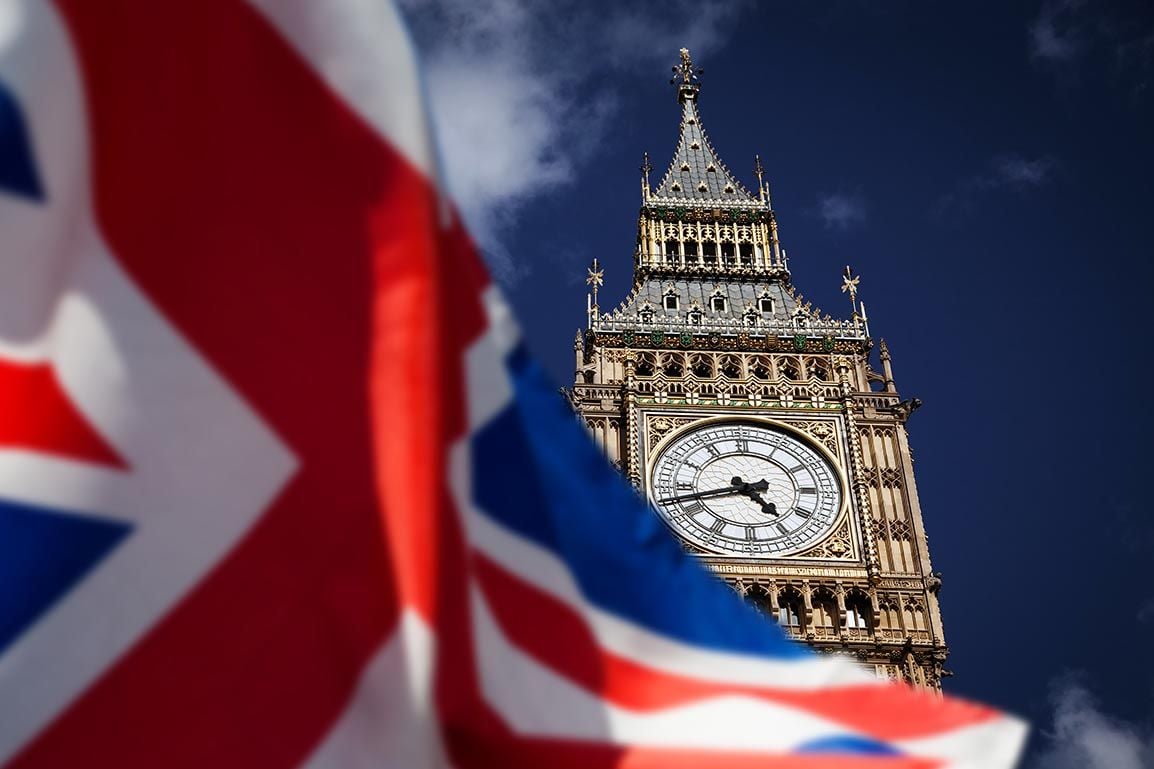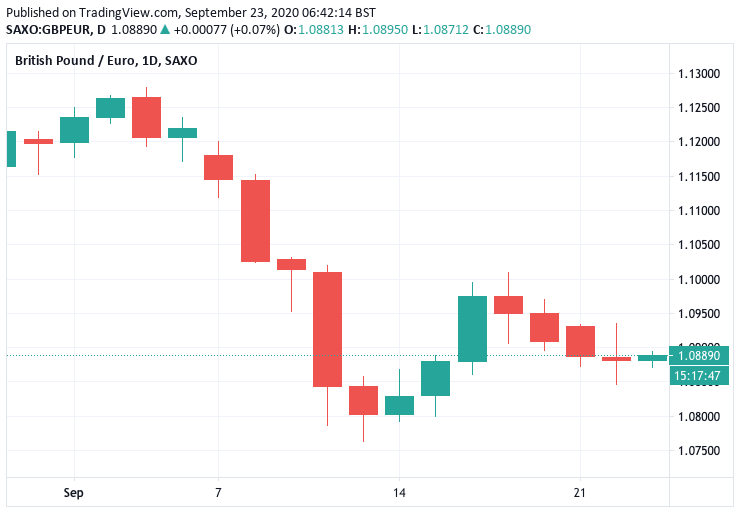Pound Sterling a Sell against the Euro: Deutsche Bank
- "Still nothing great about the Pound"
- GBP/EUR could go to 1.03 on 'no deal' in trade talks
- Fresh covid restrictions to present new headwinds

Image © Adobe Images
- Pound Euro Rate Today: 1.0889
- Bank transfer rate (indicative guide): 1.0608-1.0684
- Transfer specialist rate (indicative guide): 1.0774-1.0790
- More information on specialist FX rates here
The British Pound is expected to remain under pressure through the final three months of 2020 say foreign exchange strategists at Deutsche Bank who say they see the currency particularly at risk against the Euro.
Expectations for further weakness in the UK currency come on the back of expectations for tenuous Brexit trade negotiations, a deterioration in the UK economy and the threat of negative interest rates being introduced at the Bank of England.
"Still nothing great about the Pound," says Shreyas Gopal, a Strategist at Deutsche Bank in London. "We remain negative on sterling, with the risks around Brexit having the potential to cause an asymmetrically bigger reaction lower in the Pound."
The call by Deutsche Bank comes amidst a period of decline for the Pound-to-Euro exchange rate which has fallen through the course of September, with the primary reason for the declines being the notable deterioration in talks between the EU and UK.
The two sides remain deadlocked around issues of fishing and state aid rules - i.e. the government's right to offer monetary support to specific industries in the future. The UK wants full control over such issues in accordance with the country's newfound sovereignty, while the EU says this could confer an unfair advantage on UK businesses that trade with the EU.
The impasse has in turn been exacerbated by the UK's decision to pass the Internal Markets Bill that would allow the government to override elements of the Withdrawal Agreement treaty reached with the EU in 2019, something that has angered the EU and at one point in September markets were left wondering whether this would derail talks altogether.
"Overall, the risks around a deal are now finely balanced, primarily since we see enough flexibility in the October deadlines that talks could well extend into November if there is resolution on a political level to the issues outlined above," says Gopal.
The UK and EU Chief Negotiators David Frost and Michel Barnier are meeting in London again on Wednesday in an effort to make further progress on a deal, but sources from both sides say there will be no press briefings following the talks which suggests there are no immediate potential triggers for FX markets to navigate.
Yet, that the two sides are still talking could be taken as a sign that a deal is still possible. Last week EU Commission President Ursula von der Leyen says she believes a deal is still likely, a comment that provided a rare boost to the underfire Pound (read here about how Goldman Sachs are backing a recovery into year-end). Deutsche Bank expect a "skinny" trade deal to emerge, one that could illicit an upward reaction in Sterling but any recovery should be relatively sanguine given the ultimate deterioration in the ease of trade between the two sides.
The Pound is now down 2.75% in September and back below 1.10 at 1.0886 on the back of the market's latest assessments of Brexit talks, and "the near term risks to GBP are to the downside," says Gopal ahead of the final quarter of the year.
A further headwind to Sterling comes in the form of a potential slowdown in the UK economy which could see its recovery fizzle out over coming weeks as the UK government introduces fresh restrictions in the wake of the rise in covid-19 infections and the Government's job retention scheme comes to an end.
The scheme, which has been credited with saving millions of jobs and ultimately propping up the economy, is due to end in October and without Government support economists are expecting a hike in unemployment.
This, combined with the threat of a winter lockdown looming in the background will likely weigh on UK consumer sentiment and business investment.
"In contrast to European peers, the UK's furlough scheme will end in October and will be rotated towards jobs programmes. While this will be a step towards a more sustainable long-term economic outcome, in the near-term this poses downside risks to domestic demand, especially with Covid restrictions on activity returning across the country," says Gopal.
The Bank of England is meanwhile expected to increase its quantitative easing programme in response to the slowdown in the economy, which should weigh on UK government bond yields which would in turn stem the inflow of foreign investor capital and weigh on Sterling.
Furthermore, Deutsche Bank says the door to the Bank of England introducing negative interest rates in the near-future remains open, an outcome which could further weigh on the Pound.
Bank of England governor Andrew Bailey said on Tuesday that the market is getting too excited on the matter as the Bank is only exploring the option. However, money markets are yet to be convinced as they are pricing negative interest rates to be introduced by at least the mid point of 2021.
"The BoE continue to leave the door open to negative rates. Even if a EU-UK FTA is agreed, the MPC have lowered the bar to taking rates negative in the first half of next year by (i) launching an operational review with the PRA in Q4, and (ii) having an optimistic growth outlook to which there are now downside risks. Sterling has broadly tracked rates over the past few months (Figure 23), and we see scope for this to continue if the data disappoints as we expect," says Gopal.
Deutsche Bank are looking to sell the Pound against the Euro over the duration of the remainder of 2020.
The forecast a fall to 1.03 in Pound-Euro on a 'no deal' outcome to trade negotiations, but an eventual recovery to 1.1360 in the event a deal is reached.





